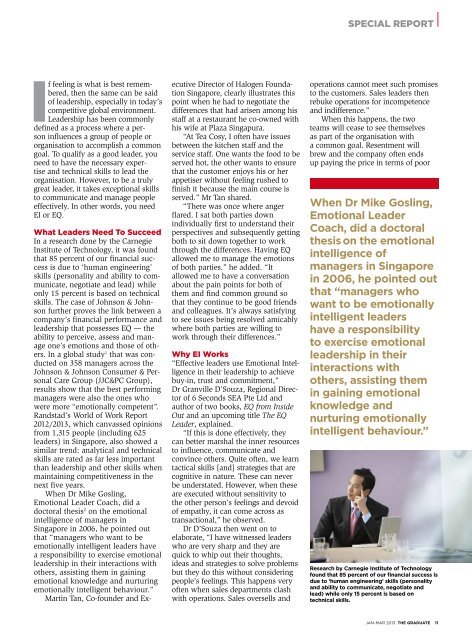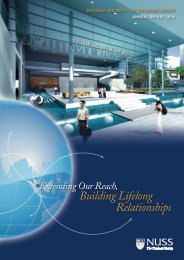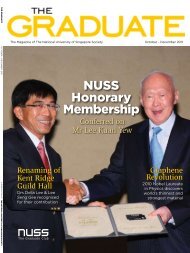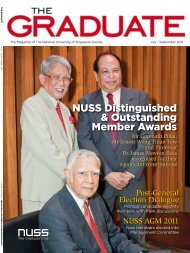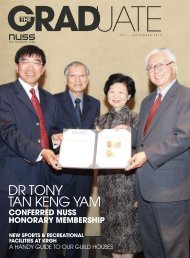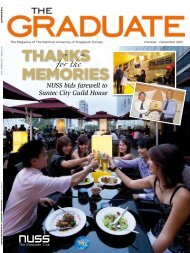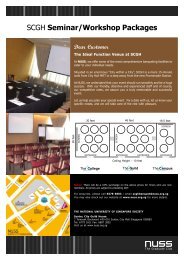The view from singapore with British High Commissioner to ... - NUSS
The view from singapore with British High Commissioner to ... - NUSS
The view from singapore with British High Commissioner to ... - NUSS
You also want an ePaper? Increase the reach of your titles
YUMPU automatically turns print PDFs into web optimized ePapers that Google loves.
if feeling is what is best remembered,<br />
then the same can be said<br />
of leadership, especially in <strong>to</strong>day’s<br />
competitive global environment.<br />
Leadership has been commonly<br />
defined as a process where a person<br />
influences a group of people or<br />
organisation <strong>to</strong> accomplish a common<br />
goal. To qualify as a good leader, you<br />
need <strong>to</strong> have the necessary expertise<br />
and technical skills <strong>to</strong> lead the<br />
organisation. However, <strong>to</strong> be a truly<br />
great leader, it takes exceptional skills<br />
<strong>to</strong> communicate and manage people<br />
effectively. In other words, you need<br />
EI or EQ.<br />
What leaders need <strong>to</strong> Succeed<br />
In a research done by the Carnegie<br />
Institute of Technology, it was found<br />
that 85 percent of our financial success<br />
is due <strong>to</strong> ‘human engineering’<br />
skills (personality and ability <strong>to</strong> communicate,<br />
negotiate and lead) while<br />
only 15 percent is based on technical<br />
skills. <strong>The</strong> case of Johnson & Johnson<br />
further proves the link between a<br />
company’s financial performance and<br />
leadership that possesses EQ — the<br />
ability <strong>to</strong> perceive, assess and manage<br />
one’s emotions and those of others.<br />
In a global study 1 that was conducted<br />
on 358 managers across the<br />
Johnson & Johnson Consumer & Personal<br />
Care Group (JJC&PC Group),<br />
results show that the best performing<br />
managers were also the ones who<br />
were more “emotionally competent”.<br />
Randstad’s World of Work Report<br />
2012/2013, which canvassed opinions<br />
<strong>from</strong> 1,315 people (including 625<br />
leaders) in Singapore, also showed a<br />
similar trend: analytical and technical<br />
skills are rated as far less important<br />
than leadership and other skills when<br />
maintaining competitiveness in the<br />
next five years.<br />
When Dr Mike Gosling,<br />
Emotional Leader Coach, did a<br />
doc<strong>to</strong>ral thesis 2 on the emotional<br />
intelligence of managers in<br />
Singapore in 2006, he pointed out<br />
that “managers who want <strong>to</strong> be<br />
emotionally intelligent leaders have<br />
a responsibility <strong>to</strong> exercise emotional<br />
leadership in their interactions <strong>with</strong><br />
others, assisting them in gaining<br />
emotional knowledge and nurturing<br />
emotionally intelligent behaviour.”<br />
Martin Tan, Co-founder and Ex-<br />
ecutive Direc<strong>to</strong>r of Halogen Foundation<br />
Singapore, clearly illustrates this<br />
point when he had <strong>to</strong> negotiate the<br />
differences that had arisen among his<br />
staff at a restaurant he co-owned <strong>with</strong><br />
his wife at Plaza Singapura.<br />
“At Tea Cosy, I often have issues<br />
between the kitchen staff and the<br />
service staff. One wants the food <strong>to</strong> be<br />
served hot, the other wants <strong>to</strong> ensure<br />
that the cus<strong>to</strong>mer enjoys his or her<br />
appetiser <strong>with</strong>out feeling rushed <strong>to</strong><br />
finish it because the main course is<br />
served.” Mr Tan shared.<br />
“<strong>The</strong>re was once where anger<br />
flared. I sat both parties down<br />
individually first <strong>to</strong> understand their<br />
perspectives and subsequently getting<br />
both <strong>to</strong> sit down <strong>to</strong>gether <strong>to</strong> work<br />
through the differences. Having EQ<br />
allowed me <strong>to</strong> manage the emotions<br />
of both parties.” he added. “It<br />
allowed me <strong>to</strong> have a conversation<br />
about the pain points for both of<br />
them and find common ground so<br />
that they continue <strong>to</strong> be good friends<br />
and colleagues. It’s always satisfying<br />
<strong>to</strong> see issues being resolved amicably<br />
where both parties are willing <strong>to</strong><br />
work through their differences.”<br />
Why ei Works<br />
“Effective leaders use Emotional Intelligence<br />
in their leadership <strong>to</strong> achieve<br />
buy-in, trust and commitment,”<br />
Dr Granville D’Souza, Regional Direc<strong>to</strong>r<br />
of 6 Seconds SEA Pte Ltd and<br />
author of two books, EQ <strong>from</strong> Inside<br />
Out and an upcoming title <strong>The</strong> EQ<br />
Leader, explained.<br />
“If this is done effectively, they<br />
can better marshal the inner resources<br />
<strong>to</strong> influence, communicate and<br />
convince others. Quite often, we learn<br />
tactical skills [and] strategies that are<br />
cognitive in nature. <strong>The</strong>se can never<br />
be understated. However, when these<br />
are executed <strong>with</strong>out sensitivity <strong>to</strong><br />
the other person’s feelings and devoid<br />
of empathy, it can come across as<br />
transactional,” he observed.<br />
Dr D’Souza then went on <strong>to</strong><br />
elaborate, “I have witnessed leaders<br />
who are very sharp and they are<br />
quick <strong>to</strong> whip out their thoughts,<br />
ideas and strategies <strong>to</strong> solve problems<br />
but they do this <strong>with</strong>out considering<br />
people’s feelings. This happens very<br />
often when sales departments clash<br />
<strong>with</strong> operations. Sales oversells and<br />
Special report<br />
operations cannot meet such promises<br />
<strong>to</strong> the cus<strong>to</strong>mers. Sales leaders then<br />
rebuke operations for incompetence<br />
and indifference.”<br />
When this happens, the two<br />
teams will cease <strong>to</strong> see themselves<br />
as part of the organisation <strong>with</strong><br />
a common goal. Resentment will<br />
brew and the company often ends<br />
up paying the price in terms of poor<br />
When Dr Mike Gosling,<br />
Emotional Leader<br />
Coach, did a doc<strong>to</strong>ral<br />
thesis on the emotional<br />
intelligence of<br />
managers in Singapore<br />
in 2006, he pointed out<br />
that “managers who<br />
want <strong>to</strong> be emotionally<br />
intelligent leaders<br />
have a responsibility<br />
<strong>to</strong> exercise emotional<br />
leadership in their<br />
interactions <strong>with</strong><br />
others, assisting them<br />
in gaining emotional<br />
knowledge and<br />
nurturing emotionally<br />
intelligent behaviour.”<br />
Research by Carnegie Institute of Technology<br />
found that 85 percent of our financial success is<br />
due <strong>to</strong> ‘human engineering’ skills (personality<br />
and ability <strong>to</strong> communicate, negotiate and<br />
lead) while only 15 percent is based on<br />
technical skills.<br />
Jan-Mar 2013 THE GRADUATE 11


